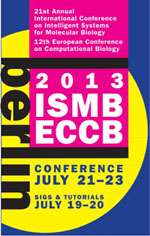CAMDA - What is CAMDA?
Currently, the Big Data explosion forms one of the grand challenges in the modern life sciences. Analysing large data sets is emerging to one of the scientific key techniques in the post genomic era. Still the data analysis bottleneck prevents new biotechnologies from providing new medical and biological insights in a larger scale. The growing need for the analysis of massive data is mainly driven by high throughput sequencing technologies and the increasing size of biomedical studies. CAMDA focuses on the analysis of massive data in life sciences. It introduces and evaluates new approaches and solutions to the Big Data problem. The conference presents new techniques in the field of bioinformatics, data analysis, and statistics for the handling and processing large data sets, the combination of multiple data sources, and computational inference.
An essential part of CAMDA is its open-ended data analysis challenge which focuses on big heterogeneous data sets. Academic and industrial researchers worldwide are invited to take the CAMDA challenge. Accepted contributions are presented in short talks (30 mins), and the results of analyses are discussed and compared at the CAMDA conference. Both contestants and other interested researchers are welcome at the meeting. Posters can provide an additional opportunity of presenting and discussing work. All individuals and groups from both academic and commercial entities are invited to join the award competition.
CAMDA has a track record as a well-recognized annual conference going back to the year 2000. It soon received considerable attention from high impact journals like Nature (ref. 1, 2) and was featured in an editorial in Nature Methods in 2008 (ref. 3). Recently called the 'Olympics for Genomics', this allusion indicates the ambitious and wide-ranging nature of the contest. The meeting has regularly been supported by organizations like EMERALD, the FDA, and the NIST.
Come join us this year, we look forward to your participation!
There are two mailing lists associated with this conference, a low-volume
announcements
mailing list, and an
open forum
for participants' free discussions relating to the contest data sets.
References:
- Johnson, K.F. and Lin, S.M. (2001). Call to work together on microarray data analysis. Nature 411, 885.
- Tilstone, C. (2003). Vital Statistics. Nature 424, 610 (link to journal)
- Editorial feature (2008). Going for algorithm gold, Nature Methods 5, 569. (link to journal)
CAMDA publications
This section contains a compendium of links, abstracts, papers, slides, programs, and tools that supplements the papers found in the proceedings.
- CAMDA 2012 – The proceeding volume will be published as a special issue of Systems Biomedicine and will be available at the beginning of 2013.
- CAMDA 2011 – Paper presentations including slides and videos!
- CAMDA 2009 – Paper presentations
- CAMDA 2008 – Paper presentations including slides and videos!
- CAMDA 2007 – Abstracts and presentations
- CAMDA 2006 – Abstracts and presentations
- CAMDA 2004 – Abstracts and presentations
- CAMDA 2003 – Kluwer publisher site | abstracts and presentations
- CAMDA 2002 – Kluwer publisher site | abstracts and presentations
- CAMDA 2001 – Kluwer publisher site | abstracts and presentations
- CAMDA 2000 – Kluwer publisher site | abstracts and presentations
Links to earlier CAMDA conferences
- CAMDA 2012, Satellite Meeting of ISMB 2012 in Longbeach, California, U. S. A.
- CAMDA 2011, Satellite Meeting of ISMB/ECCB 2011 in Vienna, Austria
- CAMDA 2009, Northwestern University, Chicago, U. S. A.
- CAMDA 2008, Boku University Vienna, Austria.
- CAMDA 2007, CIPF, Valencia, Spain.
- CAMDA 2006, Duke University, North Carolina, U. S. A.
- CAMDA 2004, Duke University, North Carolina, U. S. A.
- CAMDA 2003, Duke University, North Carolina, U. S. A.
- CAMDA 2002, Duke University, North Carolina, U. S. A.
- CAMDA 2001, Duke University, North Carolina, U. S. A.
- CAMDA 2000, Duke University, North Carolina, U. S. A.











STAY CONNECTED
Tweet